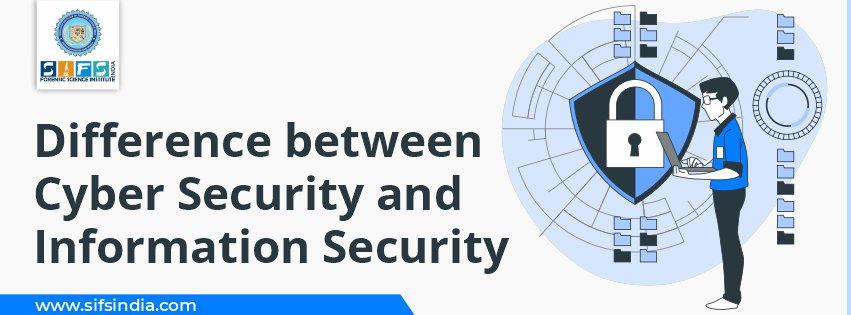- Call Us: +91 7303913002
- Email Us: education@sifs.in
Difference between Cyber Security and Information Security

BY SIFS India | March 09, 2022
Difference between Cyber Security and Information Security
People often consider cybersecurity and information security to be the same and use them in place of one another.
However, both the terms are different and cannot act as a replacement for each other.
One deals with securing the data from cyber-attacks, while the other deals with simply data protection.
Yet, for beginners, it is not easy to differentiate between them.
Also, organizations need to know the difference between them as it will help them apply the security framework best-suited for their firm.
What is Cyber Security?
Cyber security is associated with the protection of cyberspace from cyber threats and deals with protecting information in the digital format. It is a framework implemented to safeguard and secure computers, networks, programs, servers, and devices prone to cyber-attacks, hacking, or unauthorized access.
Cyber Security Examples
Network Security: It involves securing internal networks against unauthorized access or misuse using new passwords, firewalls, antivirus programs, encryption, etc.
Application Security: It involves protecting the data or code of the applications during the developmental stage from external cyber threats. It is done by implementing firewalls, antivirus and encryption programs.
Cloud Security: It involves safeguarding cloud-based infrastructures by identifying, assessing, implementing, and evaluating risk control systems.
Critical Infrastructure Security: It involves curing essential infrastructure, such as traffic lights, electricity grid, shopping centers, etc., from cyber-attacks.
Internet of Things (IoT) Security: It involves securing cyber-physical systems, such as networks, consumer devices, sensors, wifi routers, printers, security cameras, etc.
What is Information Security?
Data can be in any format, digital and non-digital both. So unlike cybersecurity, which only secures digital information, information security protects the confidentiality, integrity, and availability of the data irrespective of its form.
Information Security Examples
Procedural Controls: These controls help detect, prevent, or minimize security threats to physical assets, such as data centers, filing cabinets, and computer systems. It includes spreading cyber awareness through education to implement security frameworks within an organization successfully.
Access Controls: These controls decide who will access and use company information and networks. These include putting curbs on physical and virtual access.
Technical Controls: These include hardware and software components, such as firewalls, antivirus software, intrusion detection system, antivirus programs, etc., to protect the system from cyber threats.
Compliance Controls: These include adhering to privacy laws and cybersecurity standards by the organization to minimize security threats. It involves assessing, implementing, and evaluating security measures to mitigate risks involved in information security systems.
Final Words
Nowadays, the cases of security threats have skyrocketed.
However, due to extensive internet usage, most attacks comprise cyber threats.
Hence, both information security and cyber security measures need to be implemented to secure working environments and protect data. Most businesses have an online presence nowadays.
So, if organizations want to protect their digital assets, they need to implement a strong security structure.
The number of cyber-attacks has increased in the recent past, and it has given rise to the need for skilled security professionals is on the rise worldwide.
If you possess an interest in this field, you can go for training from a reputed institute and take up different job roles, such as information security analyst, ethical hacker, penetration tester, information security officer, etc. and give a significant boost to your salary package.
Best Online Cyber Security Courses
Gaining cybersecurity awareness is not limited to professionals only. Each individual must have enough knowledge to carry out online day-to-day tasks in this internet-driven age safely.
For this, you can enroll in short-term courses or workshops and equip yourself with the latest techniques and knowledge to safeguard your online activity from malicious hackers.
SIFS INDIA has trained thousands of students and imparted online and offline training to many corporates about cybersecurity. They are known globally for their government-recognized hands-on industry-level cybersecurity and cyber forensic training that equip you with the knowledge to safeguard you from unethical hacking activities.
Have detailed info about certificate and diploma courses offered by SIFS India:
Also, our experts are just a call away to answer all your queries. So, if you have any other doubt you can either ask in the comment below or get directly in touch with our expert.
